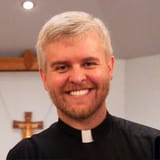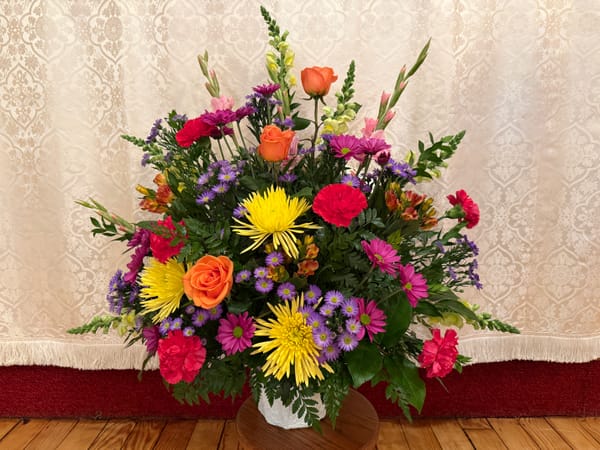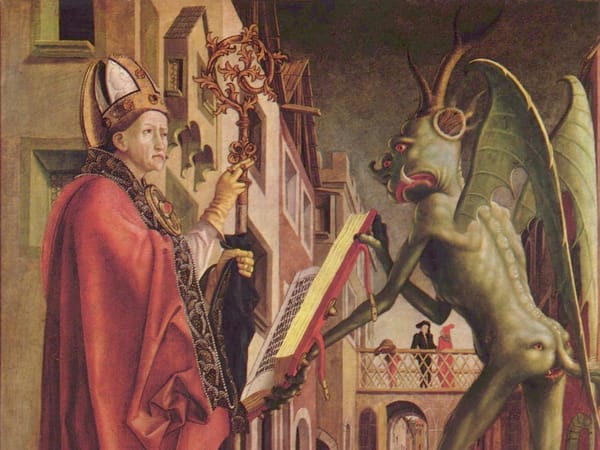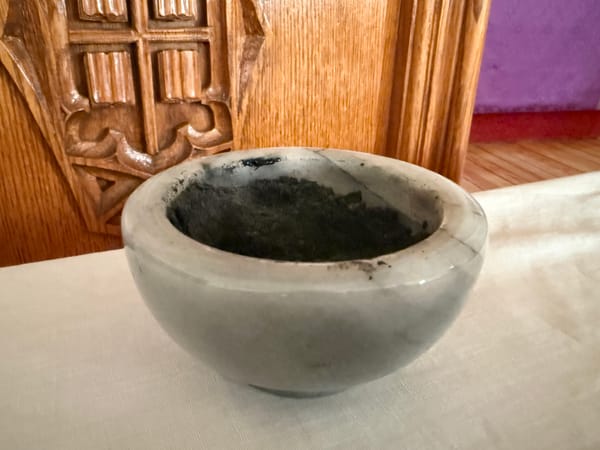The Daily Journey of World-Changing Love
We may not always love particularly well, but when we keep love as our guide, we trust that in so doing we are being formed by it all along the way.
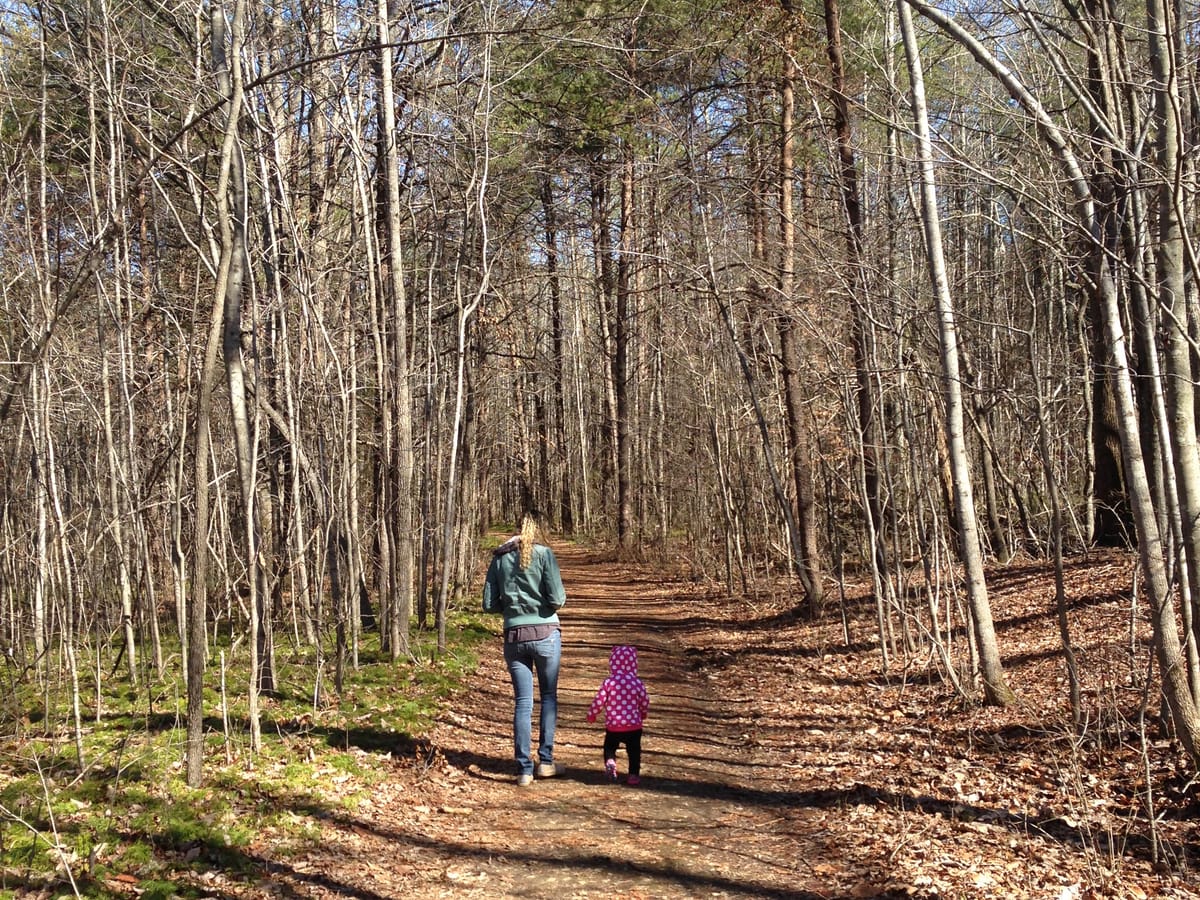
May 25, 2025 - The Sixth Sunday of Easter
My friends, I speak to you today in the name of one God, Father, Son, and Holy Spirit. Amen. Please be seated.
Happy Easter, Church of the Epiphany! That’s the last time I get to greet you with Happy Easter... next Sunday, Father Jim is preaching, and the Sunday after that is Pentecost, and then it’s Pentecost all the way to December. Get ready for months of green vestments. I know that for many, Easter is in the rearview and we’re on to summer, but Jesus is still Risen, love still wins, and we are all living in the light of the resurrection this morning.
A few weeks ago now, I was on a flight to Tennessee. Actually, I was on a flight from Grand Rapids to Chicago to catch a flight to Tennessee. Many of you have probably made similar journeys, actually, with that short flight. The Grand Rapids airport is great, too. It was my first time flying out of there, and it took me just 12 minutes to get from the curb to my gate. I had allowed quite a bit of extra time not knowing the airport, and so I wandered the concourse a little bit, looking through the books for sale (my favorite thing to do in an airport) and refusing to buy a seven-dollar cookie or a ten-dollar bag of mixed nuts. When I did return to my gate for boarding, there was a 50- or 60-year-old man waiting there watching a cartoon on his iPhone at full volume, no headphones. He was in his own little world, but we were also all in that world against our will. I prayed I did not have to sit next to him on the flight, and thankfully I was delivered from that fate.
When I did sit down, I pulled out a book, as many of us tend to do on flights, and the passenger sitting next to me made a small but audible noise of excitement and surprise. I was reading a book shaped like a good-sized brick, 1,250 pages written by Brandon Sanderson, one of Lily and my favorite authors. My seatmate asked if I had read anything else of his, because apparently she had as well, and we talked for a bit about how long yet wonderful his books are; high fantasy, his genre is called, much like Lord of the Rings, or Game of Thrones, or the Wheel of Time. She hadn’t yet worked up the courage to read the massive book I was holding, but she said she had planned to read it this summer.
I will spare you many details of this particular high fantasy book, one I actually finished last night after finishing this sermon, but I do want to share a little bit of it because it’s relevant for the message for us today. The book is called “The Way of Kings,” and it’s the first of a planned ten-book series; the fifth book came out last December. The author anticipates finishing book ten sometime around my 50th birthday. We’ll see if he does. In the book, there are many main characters, but there is one three-line creed that many of their ancient heroes lived by. There are rumors in this fictional society that this creed has a few more lines to it, but I’m only on book one; give me some time. The three lines of this creed read like this: “Life before death. Strength before weakness. Journey before destination.” Life before death. Strength before weakness. Journey before destination.
The first of those, life before death, indicates to them that the heroes defend life, always, never killing unnecessarily. But it also indicates that living is harder than dying, and always, before we die, which we all will, we should strive to truly live, and live well. Life before death. The second, strength before weakness, is similar: the heroes should use their strength to defend the weak, while also recognizing that we will all end in weakness, and we should be as strong as we can until then, for the sake of others. Strength before weakness. And finally, we have journey before destination. This one is my favorite, and I’ve thought about it a lot over the last month or so as your priest. In the book, it has come to resemble our adage that “the ends do not justify the means,” that how you get somewhere is just as important as where you end up, if not more so. The end goals, are important, sure, but the journey on our way, the work we do, the difficulties we endure, the lives we live, they all matter. We are constantly being formed by the journey.
This came up for me this week when the Episcopal Bishop of Western Louisiana, the Rt. Rev. Jake Owensby, published a critique of technology and artificial intelligence called “Soul Making in the Age of Big Tech.” I have met Bishop Jake at Sewanee, where he serves as Chancellor; I shook his hand during the peace at my graduation. He writes in his critique that in our world today, especially online, “all roads lead to life hacks, to increasingly effortless shortcuts for making life’s biggest dreams come true. Discomfort, effort, patience, frustration, and perseverance are negative experiences to be avoided at all costs... but the process of spiritual growth requires discomfort, effort, patience, frustration, and perseverance... there are no shortcuts to a full-hearted life.” The journey matters, it is required for us to grow, it is the very substance of a full-hearted life, of growth, not to be passed over. We cannot shortcut to any worthwhile destination.
On reading his critique, I was reminded of my time in CPE, Clinical Pastoral Education, when in order to continue in the ordination process, I had to spend a summer working 40-hour weeks without pay as a chaplain at Charlotte’s biggest trauma hospital. I had to push through 24-hour shifts in the emergency room, to persevere in the middle of the night, to take care of people whose loved ones were dying, to engage with endless heartbreaking stories, to offer comforting words to those who were suffering in room after room after room. Without any insult intended this morning, I swear, the daily and nightly grind of that experience helped to prepare me for my work as your priest, far more than I expected it ever would. I needed that journey of discomfort, of perseverance, of drawing on a supply of love outside of myself before I reached a worthwhile destination like this one.
The lectionary today speaks of three different journeys, which is why I felt like it was more than appropriate to bring a fictional, high fantasy novel’s creed to our pulpit this morning. In our first reading, we have the most obvious of the three journeys, Paul’s epic trip through so many hard to pronounce cities to Macedonia, around an area Tom and Father Jim just visited actually. In the second reading there’s another journey, of a sort, as an angel carries John the Revelator to a mountain in his vision, to show him a new heaven and a new earth, a poetic and symbolic river of the water of life. But I want to focus us briefly on the third journey today, from our gospel reading, a very different journey from Paul’s or John’s, that of the man healed by Jesus.
To begin with, I find it just heart wrenching to think of a man who had been sick for 38 years, lying outside this pool in Jerusalem, to think of all the blind, lame, and paralyzed laying just outside the pool. Jesus asks this particular man if he would like to be made well. The man has his reasons why he hasn’t been able to go to the pool for respite and healing, and Jesus isn’t concerned with whether they’re reasonable or not. We are told that the man simply cannot get there: no one will help him, others push ahead of him in line. And so Jesus heals him with just a word. He is made well, and he picks up his mat, and he begins to walk. He begins to walk. After 38 years of illness, he begins to walk.
I’m curious this morning what that part of this man’s journey is like, but of course, we only get these few verses with him in the text. Was his journey after being healed one of witnessing to the miracle of Christ, as Paul’s was? He has certainly already been through a lifetime of suffering, but what did this man’s life look like after being healed, after being touched by Christ? Two thousand years later, we cannot know.
But we need only look around us here in this room this morning to see what it might have been like. All of us who are gathered here at the Church of the Epiphany have been touched by Christ in some way, through the simple love of a shared meal, through a moment of radical welcome, through care that feels undeserved, or through so many other examples. We have been all deeply affected by love – and God is love – affected by love from and by and among each other. We have encountered something so different and radical and beautiful in this love that it has changed us, it is constantly changing us, each and every day. If you haven’t encountered that kind of life-changing love yet, or you’re interested in more of it, just stick around here for a while. Now that does not mean any of us have arrived somewhere, we are not at some ultimate destination of perfection, we do not live without sin, without brokenness in our lives and in our relationships. But we are on a journey, and this life-changing love of Christ is our light, it is our guide.
This journey of spiritual growth, as Bishop Owensby called it, it is also formed by our discomfort, effort, patience, frustration, and perseverance. Those are not negative experiences to be avoided at all costs. Paul writes in the book of Romans that suffering produces perseverance, perseverance produces character, and character produces hope. Another of my favorites, Paolo Freire, author of the “Pedagogy of the Oppressed,” he once said, “We make this road only by walking it.”
We may show up here to worship and be in community on Sundays, yes, but we live a life outside of this building too, a life of love in our daily interactions, alongside real discomfort, real frustration, real sorrow, real anxiety, real pain. We may not always love particularly well, but when we do our best to keep the love of God as our guide, we trust that in so doing we are being formed by it all along the way, and it only gets better. There are no “life hacks” to this way of being, there are no shortcuts to becoming well-formed disciples of Christ, we simply keep at it. There is only the bumpy journey, the road made by walking this difficult path, each and every day.
After encountering Christ in this place, in the bread and in the wine, in the love and welcome of each other, in the breaking of bread at this altar and at brunch, I pray this morning that we all may be refreshed and strengthened to pick up our own mats and walk, every day, and that if that walk is guided by the way of love, it will form us, it will change us, and it is the only thing that will make our world a better place.
Amen.
